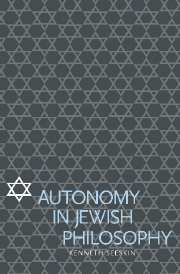Book contents
- Frontmatter
- Contents
- Preface
- Abbreviations
- 1 The problem of autonomy
- 2 Covenant and consent in the Bible
- 3 From the prophet to the sage
- 4 From the sage to the philosopher
- 5 The rise of modernity: Spinoza and Mendelssohn
- 6 The height of modernity: Kant and Cohen
- 7 Modernity under fire: Buber and Levinas
- 8 Conclusion: a partnership with God
- Bibliography
- Index
6 - The height of modernity: Kant and Cohen
Published online by Cambridge University Press: 22 September 2009
- Frontmatter
- Contents
- Preface
- Abbreviations
- 1 The problem of autonomy
- 2 Covenant and consent in the Bible
- 3 From the prophet to the sage
- 4 From the sage to the philosopher
- 5 The rise of modernity: Spinoza and Mendelssohn
- 6 The height of modernity: Kant and Cohen
- 7 Modernity under fire: Buber and Levinas
- 8 Conclusion: a partnership with God
- Bibliography
- Index
Summary
There is no need to restate Kant's view of autonomy because it has provided the focal point of this entire study. But in light of our consideration of Spinoza and Mendelssohn, it would be helpful to look at Kant's view of religion and revelation. The first thing to notice is that Kant too is a proponent of the practical turn. Although it is well known that he rejected the traditional arguments for God's existence, his criticism of them goes deeper than is usually thought. It is not just that they fail as arguments but that even if they succeeded, they would still not give us what we want from the idea of a perfect being. According to Kant (CPR A818/B846): “It was the moral ideas that gave rise to that concept of the divine Being which we now hold to be correct — and we so regard it not because speculative [theoretical] reason convinces us of its correctness, but because it completely harmonizes with the moral principles of reason.” The crux of our idea of God is that of a moral agent who asks for justice and is willing to grant mercy. Anything less would furnish us with the idea of a powerful or intelligent being but not a divine one. In another context, Kant goes further, arguing that an idea of God derived from contemplation of nature is not only a fantasy image but “a superstitious object of ceremonial adoration and hypocritical high praise.”
- Type
- Chapter
- Information
- Autonomy in Jewish Philosophy , pp. 149 - 181Publisher: Cambridge University PressPrint publication year: 2001



